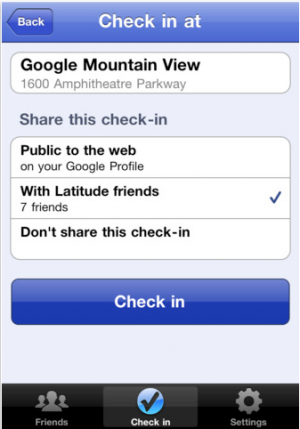Google’s Check-in Offers To Be Self-Service Tool
I spoke with Google representatives at some length last night about the forthcoming Check-in Offers, the unintentional early product “announcement” and some of the confusion around the news. Check-in Offers are an expansion of Google Coupons (renamed Offers) in Google Places. I confirmed with Google that they will be entirely self-provisioned and not sold by […]
 I spoke with Google representatives at some length last night about the forthcoming Check-in Offers, the unintentional early product “announcement” and some of the confusion around the news.
I spoke with Google representatives at some length last night about the forthcoming Check-in Offers, the unintentional early product “announcement” and some of the confusion around the news.
Check-in Offers are an expansion of Google Coupons (renamed Offers) in Google Places. I confirmed with Google that they will be entirely self-provisioned and not sold by Google or its agents.
Effectively, what’s changed or is new here is the option given to the merchant to require a consumer check-in to obtain the discount or offer. Consumers can “check in” on Google Latitude for the iPhone or the Google Places app on Android handsets. There’s no check-in capability in the iPhone Places app for some reason. Google+ may also get check-in functionality at some point. (Check-ins on Latitude can also be exposed on Google+.)
Google Check-in Offers are distinct from Google Offers, which are Groupon-style daily deals that require an up-front purchase and are sold by Google or one of its partners, which include Gilt City, HomeRun, kgbdeals, Plum District, ReachDeals, Active.com, TIPPR and others.
Confused? Bing and Facebook have also created confusion with naming and branding of multiple deals products. However, Facebook solved the problem by getting rid of one of its deals programs.
I asked Google how, given that the product is self-service, the company would ensure that the deals are sufficiently attractive to make them work for consumers and local business owners alike. Local business owners tend to have limited understanding of what “works” from a consumer perspective (they typically don’t do multivariate testing). In addition, SMBs are generally disinclined to offer aggressive 40- to 50-percent-off discounts that are typical of daily deals programs.
I was told that there would be education for business owners about what makes an effective offer, as well as editorial guidelines that must be met. For example, Google says:
Offers should provide a monetary discount or an additional good or service not normally included. We do not allow offers that are only promotional text or sweepstakes. We also do not allow free offers for products or services that are normally offered for free, this includes but is not limited to, free quotes, consultations, and inspections. Unacceptable Offer models include, but are not limited to:
- ”Best offers in the area. Call to receive your quote.”
- “Discounted savings in all departments.”
- “Enter now to win.”
- “Call now for a free quote.”
The old Google self-service coupons product was being exploited in some cases for SEO purposes by clever local SEOs. There were also a great many low-quality offers on Places that simply didn’t move the needle from a consumer perspective. This latest move is an attempt to provide a new tool for business owners and generate better content for consumers.
Facebook, Foursquare, Scoutmob, Shopkick and others also have check-in offers, which are designed to get people to visit a business without requiring a purchase in advance. They give the business owner more control and flexibility vs. daily deals and don’t require the big margin sacrifices that come with most daily deal programs.
Check-in offers also provide analytics about who actually came into a store, salon or restaurant. And they can more easily be the basis of a loyalty program — “check-in four times and the fifth meal is free” — than conventional daily deals, which often result in a rush of initial business but few repeat customers.
Postscript: I just spoke with Google again to get further clarification about the timing of Check-in Offers and the role of Google+.
What I was told is that Check-in Offers are not live today but will be rolling out next week. It will be visible in the merchant dashboard as a button, essentially, that will ask whether to require a check-in to enable redemption. (The check-in is essentially an analytics tool, because someone would need to be in the store/restaurant/salon anyway to use the offer.)
I was also told that when users check in (via Latitude on the iPhone or Google Places/Google Maps on Android) there will be an option to make the check-in public. In that event it will apparently be broadcast to your circles through Google+.
Businesses could, of course, manually post offers on Google+ as an individual update, but there’s no ability currently to publish offers automatically to Google+. And there’s no ability for users to check in on Google+ currently.
Contributing authors are invited to create content for MarTech and are chosen for their expertise and contribution to the search community. Our contributors work under the oversight of the editorial staff and contributions are checked for quality and relevance to our readers. MarTech is owned by Semrush. Contributor was not asked to make any direct or indirect mentions of Semrush. The opinions they express are their own.
Related stories
New on MarTech